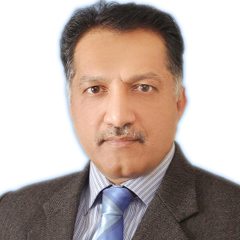
Talk about the elections for NA-122 Lahore on October 11, 2015 will remain incomplete if the name of Chaudhry Mohammad Sarwar is not mentioned. Sarwar was instrumental in organising the election campaign of Aleem Khan, the candidate of the Pakistan Tehreek-e-Insaaf (PTI), besides cobbling together an alliance of about 13 political parties against the rival candidate, Ayaz Sadiq, of the PML-N.
Before taking up the position of governor of Punjab on August 5, 2013, Sarwar knew well that the position would be ceremonial in the wake of the 18th Constitutional Amendment passed in April 2010. Despite that, Sarwar kept on publicly raising various issues ranging from the problems of overseas Pakistanis to the problems faced by the people of Punjab even if they were out of the ambit of the position he was holding. As governor, Sarwar also thought he had the right of criticising the sitting government publicly over the visit of Barack Obama to India, as if this were the last visit of any US president to any South Asian country. If Sarwar wanted to become the foreign minister of Pakistan, as he desired to be, he should not have accepted the position of governor of Punjab. Sarwar failed to fathom the limits of the position of governor and, by his actions and words, tried to politicise it.
When resigning from the position of governor on January 29, 2015, Sarwar left a message on his official Facebook page: “I decided a while back that I want to resign because I was not being able to deliver what I wanted to the masses.” The statement gave a clear message: it was not about what the masses expected him to deliver; it was what he wanted to deliver to the masses. Certainly, he was not the elected representative of the masses. His brief tenure, encompassing about one-and-a-half years as governor, makes one draw three conclusions: first, Sarwar had his own goals to achieve, whether or not they were congruent with the ground realities. Secondly, he felt no qualms about overstepping the legal limits his position held. Thirdly, he followed no norms and could embarrass his benefactor publicly.
Sarwar joined the PTI on February 10, 2015 and became its Punjab-based organiser. With him he brought a lot of experience on running election campaigns and winning elections. For instance, in 1997, after Sarwar won the seat of Member of Parliament (MP) in the general elections from the Govan constituency, Glasgow, on the ticket of the Labour Party of the UK, it was divulged that he had bribed a rival candidate, Badar Islam, to back off from his election campaign (in Sarwar’s favour), and this was inadmissible under British electoral laws. Secondly, Sarwar sought to make Islam utter a false statement in his favour (to enable Sarwar to fetch the sympathies of the voters) in return for 5,000 pounds in cash as a bribe.
Consequently, the police charged Sarwar with election fraud and attempting to pervert the course of justice. He was banned from joining the British parliament. In October 1998, Sarwar was indicted for trial in the High Court in Edinburgh, Scotland. Initially, he denied the charges on oath and said that it was not a bribe but a loan (backed by a post-dated cheque) as he was generous enough to offer the loan to Islam, his rival candidate, to contest elections against him. Interestingly, the cheque carried the name of the co-accused, Mumtaz Hussain, who was a friend of Sarwar and wanted to rescue him from the clutches of the law by producing a cheque that had been issued incidentally by Islam in Hussain’s favour in the past. It took Sarwar some time to realise that the proof of his innocence (i.e. the post-dated cheque against somebody else’s name) was a lame excuse. Hence, after six months, Sarwar admitted in the court that he lied earlier to his lawyer and Labour party officials. Sarwar pleaded innocence and accused Hussain of hatching a conspiracy against him by persuading him to present the cheque in the court. Sarwar claimed that there was no connection between the loan that he gave to Islam and the post-dated cheque produced in the court, saying that it was a norm in his community to help the poor even if they were contesting an election against the donor. This was how, by playing the community card, he got free of the charges against him and how the political career of Sarwar as the first elected Scottish Muslim MP began. Sarwar joined parliament in 1999 about one-and-a-half years after the date of its commencement. This incident makes one conclude that, in Sarwar, the PTI has a person who knows how to maneouvre elections and, if caught red-handed, how to escape from the clutches of the law.
The democratic credentials of Sarwar related to Pakistan are also known. In April 2007, at the Central Mosque of Glasgow — where Sarwar had assembled Scottish parliamentarians, select Pakistani community members and Pakistani students from the University of Glasgow — he delivered a speech and extolled the role of General Pervez Musharraf in Pakistan. He pleaded for the support of Musharraf against the lawyers’ movement. During Sarwar’s speech, this writer stood up and raised objections by literally making a counter-speech. Sarwar was flabbergasted at the turn of events and the attention of the audience was quickly diverted to this writer who spoke for democracy and the restoration of the then deposed Chief Justice (CJ) of Pakistan, Iftikhar Mohammad Chaudhry. Sarwar had to leave his speech unfinished.
Lately, Imran Khan, the chairman of the PTI, has also turned against Justice Chaudhry. Expectedly, both Sarwar and Khan will keep on sharing anti-Justice Chaudhry feelings with each other before they realise that the way the PTI has conducted itself in the NA-122 elections, democracy has been harmed.
The writer is a freelance columnist and can be reached at qaisarrashid@yahoo.com
